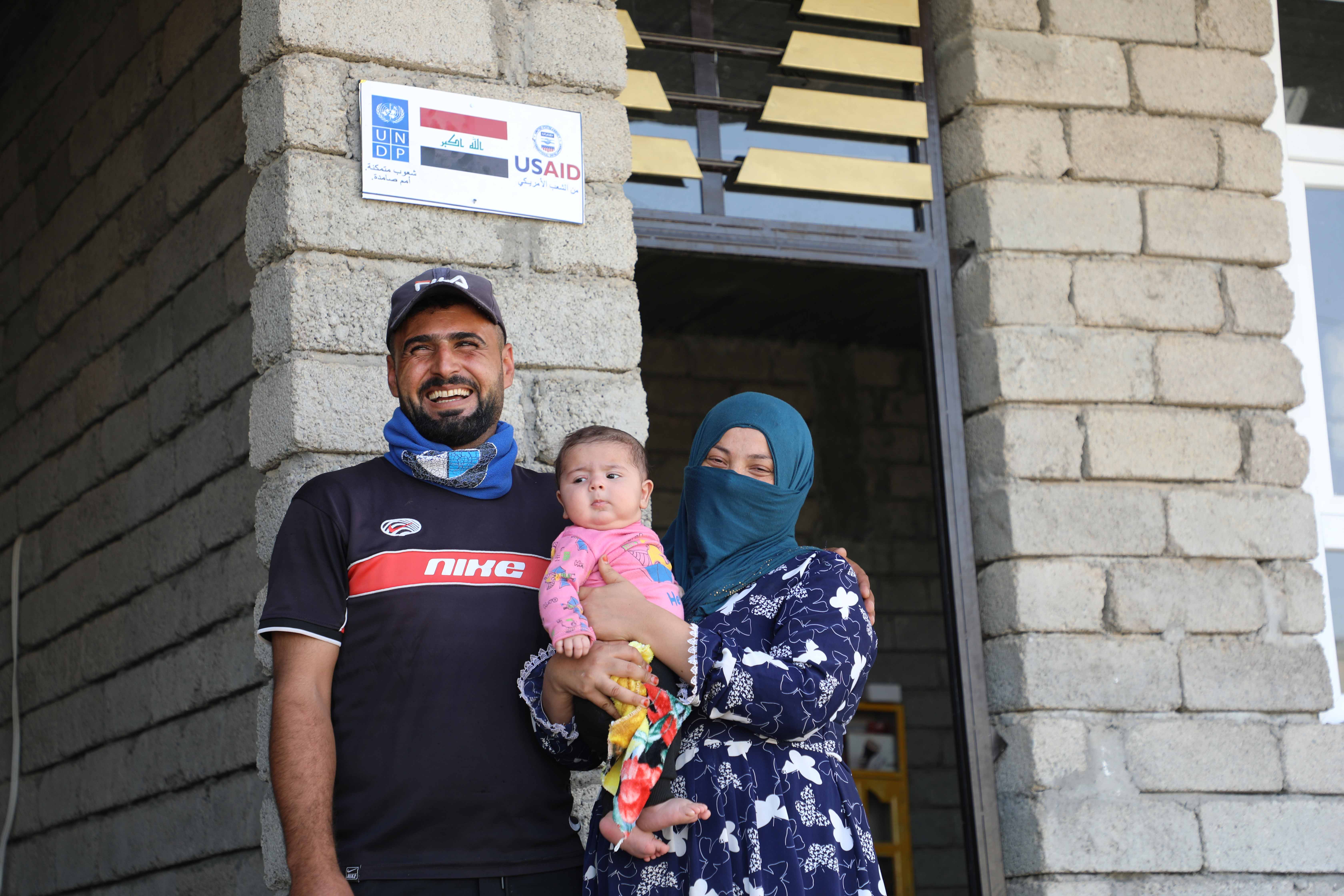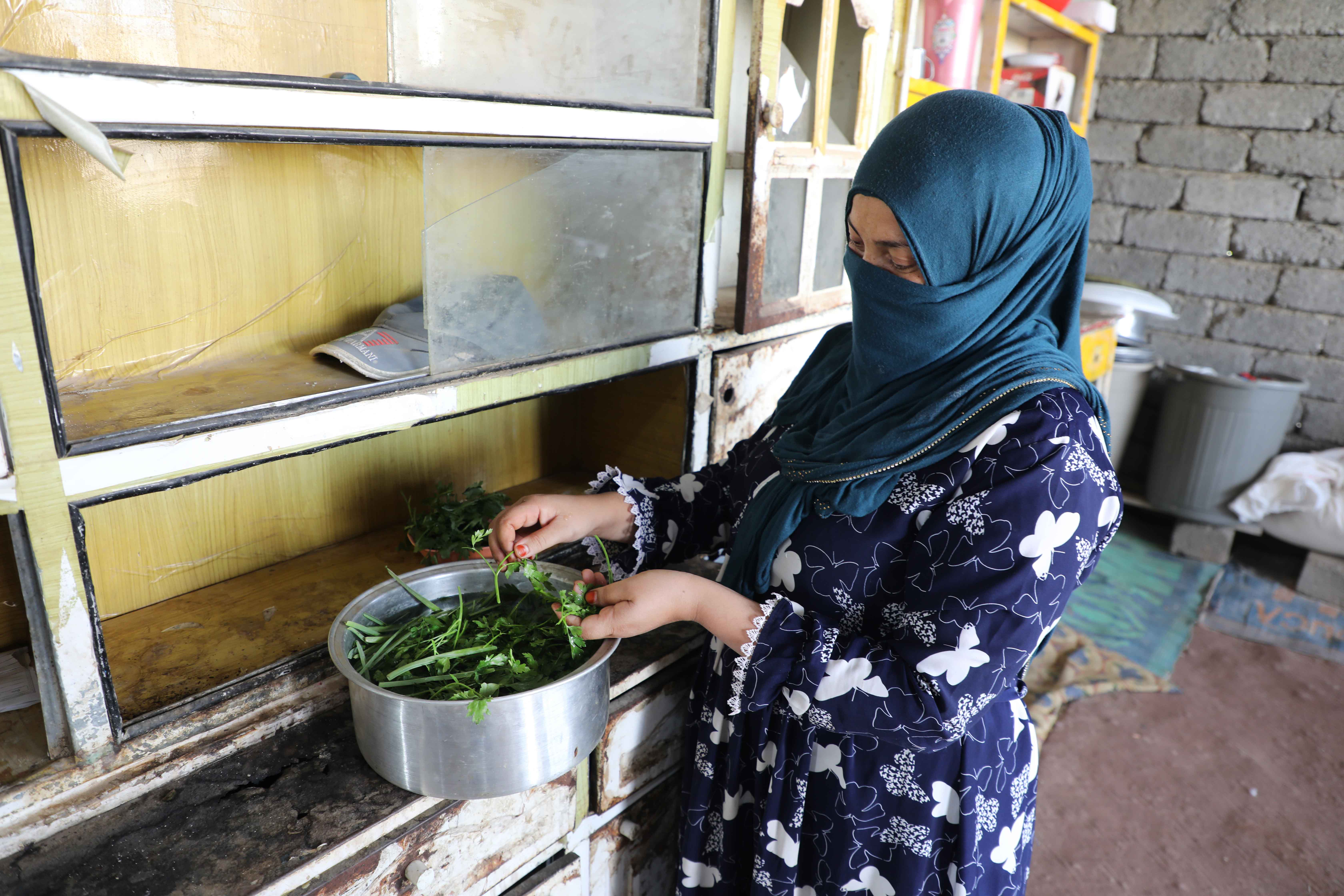When love for life and hope are stronger than anything else.
I named her Solaf !
June 4, 2024

Abd Al Karim Saleh begins his story by saying: "I named her Solaf [1], a Kurdish name meaning 'waterfall,' because it symbolizes a strong and steady stream of water." By choosing this name for his daughter, he wanted to express the strong and swift return of life to his home, along with the unity and resilience in the area. Solaf was born around the time Abdul Karim returned home, which had been destroyed during the fight to liberate Iraq from ISIS. Like millions of other Iraqis, his family had to escape, leaving behind everything they knew.

Abd Al Karim, 35 years, is a father to three children, the youngest among them is Solaf, who is now ten months old. He returned to his home in the Shirqat area in Salah al-Din Governorate after UNDP rehabilitated his home with support from USAID, and he was able to resume his job as a daily wage worker. Abdul Karim says: "I know my work is simple, but with its simplicity, I believe it contributes to revitalizing Shirqat and bringing life back to it. We want to live a dignified and normal life, we deserve that.”


Far from home
He remembers the difficult moments that he and his family lived while fleeing ISIS: “The war forced us to escape. I escaped with my family to several places, and we were forced to take shelter wherever we could. At times, the areas where we sought safety were not suitable for humans to live in, but we needed to survive. There were times where we slept outside, with no roof or walls to protect us. I was afraid that my children would be exposed to insect and scorpion bites, and when this happened, I used ointments to ease the pain of their bites. It was a tough time and we suffered greatly.”

Rebuilding their life after the ashes
After the liberation of Shirqat, Abd Al Karim began working to rebuild his house. In the beginning, his family helped him lay the foundation and build one room. Later on, he was able to build two additional rooms, along with a bathroom through the housing project under the Funding Facility for Stabilization (FFS) program. This program, funded by USAID and implemented by UNDP, rehabilitated 1,317 homes in different governorates, including Anbar, Salah al-Din, Ninewa, and Kirkuk, allowing more than 7,262 people to return to their homes safely and with dignity [2].
[1] "Solaf" it is Kurdish name meaning 'waterfall,' because it symbolizes a strong and fast-moving stream of water.
[2] United States Agency for International Development.

Abd Al Karim, like many other internally displaced persons who fled ISIS, faced difficult conditions and had to move from one place another just to survive. “For the first time, I knew what it felt like to be truly thirsty, as water was limited. At times, we lived in the open, surrounded by darkness since electricity was not available. I almost stopped hoping for a better future because of the lack of job opportunities,” he mentioned.
In Abd Al Karim’s words: “We rebuilt our lives from zero. We had absolutely nothing, but for the first time in a long time, I have hope!”.

Home sweet home
Today, Abd Al Karim is a new person, full of hope for the future. He is grateful that his house was rebuilt, allowing his family to return home safely.
"I wish you knew how grateful I feel. Without this support, I wouldn’t have been able to return to my home. Now that I'm back, my family is with me again, and we are getting back to our normal, decent living conditions. I’m blending in with my community again and helping my family stay socially active.”
During the fight against ISIS, millions were forced to flee, leaving their homes and lives behind. As a result, they experienced widespread destruction and years of instability. This program prioritized building houses for the most vulnerable families. Rehabilitation efforts involved rebuilding and restoring walls, replacing windows and doors, and improving electricity and sewage systems. The target areas were selected based on consultations with local government and the District Attorney’s Office, taking into consideration the number of returnees and the extent of damage to their homes.
Today, Iraq is gradually recovering. UNDP and USAID are working closely with the Iraqi government and the international community to rebuild the cities destroyed by ISIS and ensuring a safe and dignified return of IDPs [3] to their homes again.
[3] Internally Displaced Persons
About: The project was implemented by UNDP's Funding Facility for Stabilization with funding from USAID, to ensure a safe and dignified return for IDPs after the liberation of their areas, as well as help them resume their lives again and work normally.

 Locations
Locations


